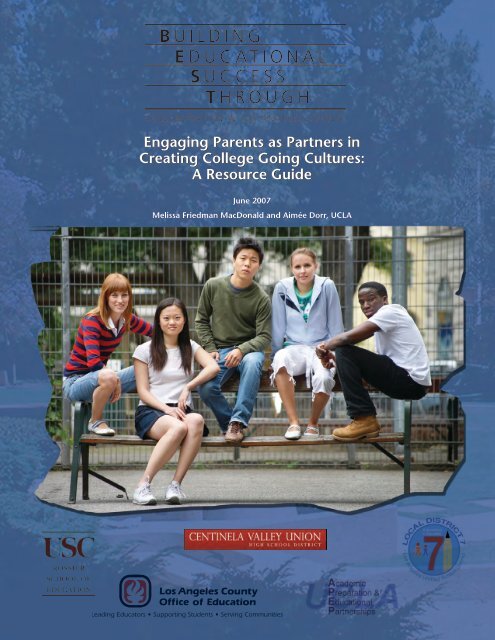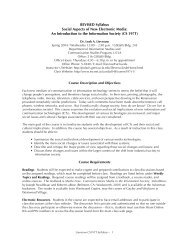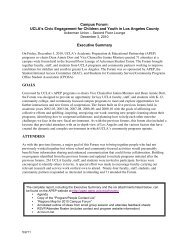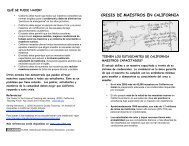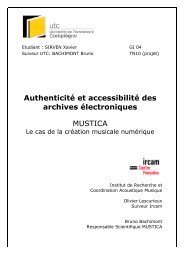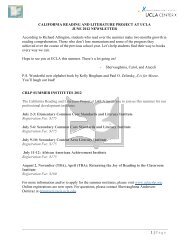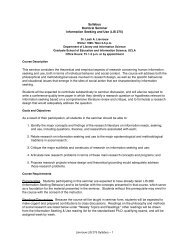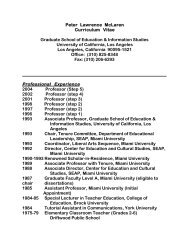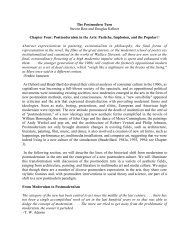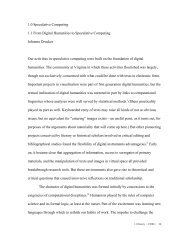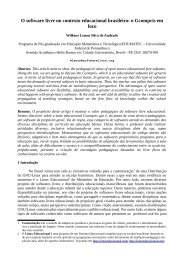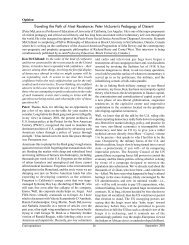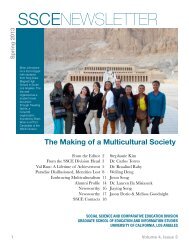A Resource Guide.pdf - UCLA APEP
A Resource Guide.pdf - UCLA APEP
A Resource Guide.pdf - UCLA APEP
Create successful ePaper yourself
Turn your PDF publications into a flip-book with our unique Google optimized e-Paper software.
B U I L D I N G<br />
E D U C A T I O N A L<br />
S U C C E S S<br />
T H R O U G H<br />
COLLABORATION IN LOS ANGELES COUNTY<br />
Engaging Parents as Partners in<br />
Creating College Going Cultures:<br />
A <strong>Resource</strong> <strong>Guide</strong><br />
June 2007<br />
Melissa Friedman MacDonald and Aimée Dorr, <strong>UCLA</strong>
Engaging Parents as Partners in Creating College Going Cultures:<br />
A <strong>Resource</strong> <strong>Guide</strong><br />
Melissa Friedman MacDonald and Aimée Dorr<br />
University of California, Los Angeles<br />
June 2007<br />
Ensuring college readiness and access for all students has been a longstanding concern for<br />
educators throughout Los Angeles County. Because parents influence student achievement<br />
and college going, increasing parent engagement in the college process has been one focus in<br />
regional efforts to improve college preparedness and college going. Prepared as part of the Building<br />
Educational Success Through (BEST) Collaboration in Los Angeles County initiative, this report<br />
is meant to serve as a resource for regional educators striving to develop and/or improve parental<br />
involvement programs aimed at creating college going cultures in their schools. More information<br />
about the BEST Collaboration in Los Angeles County initiative and other publications of the<br />
initiative can be found at http://apep-bestla.gseis.ucla.edu/.<br />
Building upon the work of previous BEST conferences which have focused broadly on creating<br />
college going cultures in high schools, this report provides detailed information regarding one<br />
important aspect of such cultures: parental involvement. The content is drawn from multiple<br />
sources associated with the BEST initiative, particularly the April 26, 2007 BEST conference<br />
“Engaging Parents as Partners in Creating College Going Cultures.” Conference participants from<br />
five successful partnerships of school districts and institutions of higher education from across LA<br />
County and from the Los Angeles County Office of Education provided information about existing<br />
parent program models, effective program features and activities, and areas of concern. Two of the<br />
conference panelists provided their particular perspectives on what works and what does not work.<br />
The panel moderator, an expert on college access, summarized research evidence on what works,<br />
and BEST staff compiled a list of existing local parent programs (see Appendix A) and a set of<br />
recommended readings (see Appendix B). Brought together in this guide, these various resources<br />
offer a wealth of information, ideas, inspirations, and cautions to those interested in engaging parents<br />
in creating college going cultures.
Factors that Influence Parental Involvement in the College Process<br />
Both family status (e.g., income, education, ethnicity, marital status) and school factors are related to parent<br />
involvement. In particular, parent perceptions of the school environment are critical determinants of their<br />
involvement. Parental views of teacher roles, the nature of teacher-parent communication, and parental<br />
perceptions of their degree of control over their children’s success at school are all important predictors of<br />
parental engagement in general and as it relates to college preparation.<br />
v Schools that understand the family characteristics of their students and provide welcoming,<br />
sensitive environments for parents are more successful in increasing parental involvement<br />
In general, the amount of information parents receive and how comfortable they feel at school and in their<br />
communications with school staff, especially teachers, shape the extent to which parents become involved.<br />
Implementing Parent Involvement Programs: Strategies and Activities<br />
Build a Parent Network: Parents Listen to Other Parents<br />
Word of mouth among parents is a powerful force that should not be underestimated when attempting to<br />
increase parental involvement in college going activities and programs. Parents value what other parents say<br />
and often listen more to their peers than to teachers, counselors, and administrators. For this reason, school<br />
staff should leverage already involved parents in the effort to build a broader parent network.<br />
Schools can build a parent network by:<br />
v Developing a parent peer college counseling model where parents of seniors seek out and mentor<br />
parents of incoming freshmen<br />
v Including parents in the school leadership team and encouraging them to communicate information to<br />
other parents<br />
v Educating parents to be advocates for parental involvement<br />
v Teaching parents to navigate the college preparation process in high school (e.g., how to enroll their<br />
children in A-G courses, learn about and apply for financial aid, access and sign up for testing)<br />
v Establishing mechanisms to communicate with parents in a welcoming manner, remembering that<br />
print materials such as monthly newsletters are useful and friendly personal phone calls from other<br />
parents and school staff can be especially effective<br />
v Holding monthly social events (e.g., picnics, dinners) so that parents, students, and school staff can get<br />
together as a community<br />
v Creating an infrastructure to support the development of college-minded parent cohorts beginning<br />
when their children are in ninth grade and offering a support system that meets regularly to discuss<br />
their children’s academic experience and future plans, motivate one another, and collectively problem<br />
solve common challenges encountered in preparing their children for college
Develop a Comprehensive, Academic-Focused Parent Center<br />
Many parent centers are social spaces instead of academic environments. Transforming parent centers from<br />
a place for socializing into a resource for college information and support is an effective mechanism for<br />
engaging parents in the college going process. In cases where there are both a parent center and a college<br />
center, there should be regular communication between the coordinators of both sites in order to provide<br />
relevant, accessible college education programs for parents.<br />
Strategies for creating college-focused parent centers include:<br />
v Hiring a full time parent liaison to manage the parent center, including parents in the interview<br />
process, and using Title I funds if applicable<br />
v Creating a library for parents that includes books and other materials on topics such as learning<br />
languages, college requirements, testing, and financial aid<br />
v Implementing effective parent retention strategies, including the following:<br />
• Inviting parents to fill out a raffle ticket each time they visit the center and/or participate in an<br />
event<br />
• Holding monthly raffles for retail gift certificates and/or trips to theme parks and sporting events<br />
(such prizes can be secured by parent liaisons who actively solicit donations from local businesses<br />
and vendors)<br />
v Communicating information about center events and available resources via a monthly parent newsletter<br />
or bulletin that can also be posted on the school web site<br />
v Soliciting parent input regarding the mission and goals of the parent center<br />
v Sponsoring monthly parent meetings (see next section for specific strategies)<br />
Create Parent Workshops at the School Site<br />
In order to be active participants in their children’s college trajectory, parents need information about<br />
how they can help and support each child in his/her college preparation process at home. Although most<br />
parents already possess a strong desire to help their children navigate the college process, many need more<br />
knowledge and skill to do so effectively.<br />
For this reason, parent workshops held at the school site are powerful mechanisms for educating parents about<br />
college requirements and admission procedures. Presentations, literature, and worksheets are always useful.<br />
Especially effective and empowering is a workshop format in which parents carry out the processes needed<br />
to access, organize, and complete college documents. In addition, such workshops can provide meaningful<br />
opportunities for parents to network with one another.<br />
Effective parent workshops can be developed by:<br />
v Having parent advocates or people from the community with similar lived experiences teach the<br />
workshops because parents respond better to facilitators whom they can relate to and whom they<br />
perceive to be “like them”
v Ensuring that workshops are translated into English and Spanish (or other home language) so that all<br />
parents feel welcome to attend and participate<br />
v Creating space in workshops for parents to share relevant testimonials, concerns, and questions<br />
v Surveying parents for a list of workshop topics of interest to them and then planning relevant learning<br />
experiences<br />
v Teaching parents about public schools and their history so that parents believe schools are responsible<br />
for educating their children well, feel empowered to criticize aspects of the school, and realize it is<br />
important to advocate for their children’s education<br />
v Educating parents about the entire college preparation process including necessary coursework,<br />
college forms (e.g., admissions, financial aid, testing), and the college application and admissions<br />
process (e.g., writing personal statements, acquiring letters of recommendation)<br />
v Inviting recent high school graduates who are current college students to speak to parents about what<br />
is expected of their children in high school in order to successfully apply to and enroll in college<br />
v Informing parents about existing college-related resources and support programs in their local<br />
communities<br />
v Providing parents with information about funding opportunities available to their children (e.g.,<br />
special scholarships, grants, loan programs)<br />
v Holding workshops on Saturdays, in the evenings, or at other times at which working parents can<br />
participate<br />
v Serving food at meetings<br />
v Creating a parent leadership council that is led by parents, includes active participation from an<br />
administrator, holds meetings over a 1-3 hour period so that parents and administrators can “drop in,”<br />
and allows parents to gather, hear one another’s concerns, and collectively decide how to resolve the<br />
issues raised
Ensure that Parents Have Access to College Campuses<br />
It is not enough merely to provide families with information about colleges and universities. Parents and<br />
students need to have first-hand experiences with institutions of higher education so that they can learn about<br />
and understand the academic and social culture. Parents and students need to feel comfortable on college<br />
campuses so that they can envision these academic spaces as relevant to them.<br />
Suggestions for planning regular trips for families to visit local colleges and universities include:<br />
v Inviting parents to accompany students on college visits to attend college classes and other activities<br />
with them or network with one another<br />
v Holding college preparatory activities or other parent education workshops on a college campus so<br />
that parents become comfortable in these spaces<br />
v Creating a “day in the life of a college student” program for parents in which a parent shadows a<br />
current university student for a day so that the parent can attend classes, experience residential life,<br />
and learn about the campus<br />
Provide Parents with Relevant College Information Presented in Accessible Language<br />
The vast majority of information about college requirements (e.g., coursework, testing), the college<br />
application process, and financial aid is presented in technical language that is not easily accessible to anyone<br />
who is not directly involved in college admissions. For this reason, much of the information that parents<br />
receive about college going is difficult to understand. School staff should make a concerted effort to provide<br />
parents with college information presented in an everyday, non-technical style and in the language that the<br />
parent speaks and reads.<br />
Parent Involvement Programs from Other Perspectives<br />
The suggestions presented so far reflect the perspectives expressed in small group discussions among<br />
participants in the April 2007 “Engaging Parents as Partners in Creating College Going Cultures” conference.<br />
Another perspective on the development of effective parent involvement programs comes from two<br />
experienced parent leaders, Ms. Mary Johnson and Ms. Guadalupe Torres, who created their own set of<br />
recommendations for this resource guide. In addition, Dr. Patricia McDonough, whose research focuses on<br />
creating college going cultures, provided the opportunity to include a summary of recommendations drawn<br />
from the research literature. The parent and scholar perspectives are presented below. There is a reassuring<br />
similarity in the main ideas in all three perspectives, those above and those below. There is also a useful<br />
diversity of ideas and of their expression, offering more opportunities to learn about how to create and sustain<br />
effective parent involvement in creating a college going culture.
Drawing from Parent Leaders:<br />
Recommendations for Promoting Parental Engagement in the College Process<br />
Collaborate with parents to create parent education workshops<br />
v Build good relationships with parents by listening to their concerns and having them decide about<br />
the types of workshops that would best suit their needs<br />
v Encourage parents to take a hands-on role in planning and implementing the workshops<br />
v Develop workshops that not only provide information and resources, but also create a space for<br />
parents to share current and past experiences, to voice questions and concerns, and to be active<br />
and interactive with each other and any participating experts<br />
v Hold all parent meetings in both English and Spanish<br />
v Conduct parent meetings after school and in the evenings so that working parents can participate<br />
v Have workshops taught by parent leaders or community members who represent parent interests<br />
and understand parent value systems, because parents respond best when they trust the facilitator<br />
and feel the he/she respects their lived experiences<br />
Work with parents to develop a parent leadership council<br />
v Present the need for a leadership council to parents in a parent workshop<br />
v Conduct a survey of how parents think the council should be organized (e.g., types of positions,<br />
length of term for positions, responsibilities, meeting format and schedule) and include space for<br />
nominations for parent leaders<br />
v Synthesize the survey results and distribute to parents<br />
v Hold an election so that parents can vote for candidates<br />
v Disseminate the information and collaborate with the elected leader to establish a meeting<br />
schedule and a mechanism for documenting and distributing meeting content<br />
Include parents in school decision making, particularly budget meetings<br />
v Give parents the opportunity to make suggestions about the school budget based on their<br />
perceptions of where the school needs improvement<br />
v Solicit parental feedback using a questionnaire about school needs and budget allocations<br />
Maintain full-time, college-oriented parent centers<br />
v Keep parent centers regularly accessible to parents by having them open full time during and after<br />
the school day<br />
v Involve parents in the hiring process for the parent center coordinator and, if possible, use Title I<br />
funds to support the coordinator<br />
v Provide parents with a clearinghouse of college information and community resources, including<br />
books, lists of web sites, and listings of local parent organizations and social service agencies<br />
v Partner with outside parent organizations in order to maximize the information and services<br />
available to parents
Drawing from the Research:<br />
Lessons Learned from Studies on Parental Involvement Programs<br />
v College access programs should take a holistic approach to parents, emphasizing the importance of<br />
self-esteem, parenting practices, communication, and empowerment<br />
v There should be a focus on the relationship between the parents and the program to build trust and<br />
cultural sensitivity<br />
v Parents of low-income and minority students need much knowledge about college preparation,<br />
finances, admissions, entrance examinations, and college life<br />
v The admissions and financial aid process is unnecessarily mysterious and confusing to parents who<br />
should be encouraged to call the financial aid office and ask for an explanation of the process and/or<br />
financial aid offer<br />
v Parents are particularly concerned about the rising college costs, loans, and the high costs of books<br />
v African American and Latino parents are often discouraged by overburdened K-12 schools, negative<br />
press about affirmative action, and media reports on soaring college costs (the need for increased<br />
reliance on loans and the decreased availability of grants)<br />
v Language problems and communication barriers with schools often impact parents in their attempts to<br />
motivate their children<br />
Drawing from the Research:<br />
Best Practices and Recommendations For College Access Programs Working with Parents<br />
v Have parents invite new parents to increase attendance at workshops and events<br />
v Mail flyers directly to parents with a follow-up phone call<br />
v Provide written materials with clear college expectations and admissions requirements and in the<br />
language spoken by the parent(s)<br />
v Attempt to provide access to college admissions officials on the high school campus<br />
v Offer accurate financial aid and standardized testing information<br />
v Secure resources for trips for students and parents to college campuses<br />
v Ask questions tailored to individual student and family circumstances<br />
v Include local parents who have succeeded in getting their child into college in the workshop planning<br />
and delivery<br />
v Recognize that parents, grandparents, aunts, uncles, and siblings collectively make up a support<br />
system<br />
v Provide strategies for how parents can best help their students prepare for college at home<br />
v Give parents information about how to help their students choose high school classes that are<br />
college preparatory
Conclusion<br />
This resource guide has presented important practical information from three different sources about how<br />
to effectively engage parents as partners in the college process. Readers have encountered suggestions from<br />
conference participants who consisted of educators from across LA County, from two parent leaders, and<br />
from a researcher in college access. In addition, information about existing local parent programs and about<br />
further reading is provided in the two appendices. As a whole, this resource guide provides useful ideas and<br />
strategies for educators, researchers, and parents seeking to develop new parent involvement programs or to<br />
improve existing programs.
Appendix A<br />
Local College-Related Parent Involvement Programs and <strong>Resource</strong>s<br />
African American Parent Community Coalition for Educational Equity, Inc. (AAP/CCEE Inc.)<br />
AAP/CCEE Inc., a grassroots organization, was founded in 1995 by a group of parents at Westchester High<br />
School (in the Los Angeles Unified School District) who witnessed, first hand, the need for parents to be<br />
trained and empowered around educational issues. The purpose of AAP/CCEE Inc. is to identify and seek<br />
remedies for the root causes of poor student outcomes as they relate to test scores, college admissions,<br />
behavioral issues, drop out and suspension rates, and teacher performance. It is also to educate and train<br />
parents, students, educators and the community to recognize the direct relationship between race, class,<br />
academic achievement, and economics.<br />
AAP/CCEE Inc.’s unique and highly effective parent training classes and seminars/workshops are made free<br />
of charge to parents as a result of the generosity and support of donations and grants provided to AAP/CCEE<br />
Inc. to ensure that all parents have access to this empowering curriculum and information, regardless as to<br />
their socio-economic challenges. Funding is also provided by progressive and committed school districts and<br />
community based organizations that understand the tremendous value of well-trained, involved parents.<br />
AAP/CCEE Inc.’s City-wide Seminars/Workshops are provided, free of charge, two-three times per year.<br />
Each seminar/workshop is focused on key topics such as: The California Content Standards, Standards in<br />
Practice, The No Child Left Behind Mandates, The Importance of Choosing the Right Classes, College<br />
Entrance Requirements, Belief Systems: How Do They Affect Student Achievement, Creating A Collegegoing<br />
Culture At Home, etc.<br />
Further Information:<br />
For more information on AAP/CCEE Inc. visit http://aapccee.org or contact Goldie Buchanan, Program<br />
Director, at 323-291-5546.
College Bound<br />
College Bound is a grassroots, non-profit organization dedicated to serving under-represented and minority<br />
students and families in the greater Los Angeles area with college admissions. It is a group of concerned<br />
parents working together to supplement the day to day educational programs offered to children in both<br />
public and private schools. Offering a unique approach to college counseling, College Bound provides<br />
development of study and success skills, parental participation, a monthly study program and guidance in the<br />
admission and financial aid processes. College Bound’s Saturday School program operates from September<br />
through May on the campuses of Pomona College and Loyola Marymount University in Los Angeles. The<br />
program participants, students and parents, gather together on a monthly basis to learn about the college<br />
application process and admissions requirements. While students are in their Saturday School classes, their<br />
parents are also required to attend classes taught by community leaders. These leaders share their knowledge<br />
in areas such as academic competitiveness, parental rights in public and private schools, financial planning,<br />
and conflict resolution. College Bound students in grades 4-11 participate in summer enrichment programs<br />
hosted by colleges and universities around the country. These programs expose students to the academic and<br />
social aspects of college life, while enhancing academic skills in various subject areas and fields of interest.<br />
Further Information:<br />
For more information visit http://www.collegeboundca.org/about.html. In addition, more information can<br />
be obtained by phone at 562-860-2127 or via email at info@collegeboundca.org. A complete list of College<br />
Bound program staff and their contact information can be found at http://www.collegeboundca.org/contact.<br />
html.<br />
Community Asset Development Re-Defining Education (CADRE)<br />
Community Asset Development Re-Defining Education (CADRE) is an organization of African American<br />
and Latino parents in South Los Angeles. Maisie Chin, director of CADRE, claims that traditional models<br />
of parent involvement in schools, such as volunteering in classrooms, often do not work in low-income<br />
communities. As such, CADRE is a parent led campaign with a mission to solidify and advance parent<br />
leadership to ensure that all children are rightfully educated regardless of where they live. CADRE empowers<br />
and prepares parents to visit their children’s schools, ask questions, and get involved in every aspect of their<br />
student’s education.<br />
Further Information:<br />
For more information about CADRE call 213.747.1467.<br />
0
The Los Angeles Parents Union (LAPU)<br />
The Los Angeles Parents Union (LAPU) is a parent-operated coalition dedicated to ensuring that the Los<br />
Angeles Unified School District is transformed into the best school district in the nation within the next 10<br />
years. The mission of the Los Angeles Parents Union is to ensure that small, safe, autonomous schools exist<br />
locally in every community. This will be achieved by building a coalition of concerned parents citywide to<br />
demand the transformation of LAUSD within the next 10 years. LAPU supports utilizing the “Six Tenets of<br />
High Performing Public Schools” as a proven model for improving failing public schools.<br />
Further Information:<br />
For more information on LAPU visit http://www.smallschools.org/.<br />
National Coalition for African American Parent Involvement in Education (NCAAPIE)<br />
The National Coalition for African American Parent Involvement in Education (NCAAPIE) is a non-profit<br />
organization whose purpose is to improve the academic achievement of African American youth. This<br />
organization also focuses on improving the quality of public schools in low-income African American<br />
communities through parental involvement, education, advocacy, community organizing, and leadership<br />
development.<br />
The aim of NCAAPIE is to eliminate the institutional and political barriers which contribute to the<br />
achievement gap that exists between African American students and students of other races and ethnicities.<br />
Although this program targets African American students, NCAAPIE welcomes and embraces parents of<br />
ALL races and ethnicities. NCAAPIE enables African Americans and other minorities to secure economic<br />
self-reliance, parity, power, and civil rights through advocacy activities and the provision of programs and<br />
services in Los Angeles.<br />
Further Information:<br />
For more information about NCAAPIE and their parent resources, calendar of workshops and events, and<br />
publications visit www.ncaapie.org or email the organization at admin@ncaapie.org.
National Parent School Partnership Program (PSP): A MALDEF Program<br />
The National Parent School Partnership Program (PSP) is a national program designed to train parents, school<br />
personnel, and community-based organizations to lead in the educational attainment of children.<br />
MALDEF’s PSP training manual and curriculum provide trainers with complete, easy to follow 16-week<br />
sessions, procedures, forms, and best practices to successfully implement and sustain the program anywhere<br />
in the country. The curriculum offers sessions that highlight: parent rights and responsibilities, structure and<br />
function of schools, the parent/teacher conference, understanding group process, principles of leadership, and<br />
the road to the university.<br />
Further Information:<br />
For more information on PSP visit www.maldef.org/psp/.<br />
Parent Academy (Los Angeles County Office of Education)<br />
Created by the Los Angeles County Office of Education (LACOE), the Parent Academy provides training,<br />
resources, and information to further academic achievement, parent/child/school success, and to support<br />
parents as leaders for effective school-site parent involvement as required by No Child Left Behind. All<br />
presentations are conducted at the school site, are available in English and Spanish, and cover a wide range<br />
of topics including College for Success 1 & 2, Parents Working with Parents, Parents as First and Most<br />
Important Teachers, STAR, Standards and More, and Helping with Homework.<br />
Further Information:<br />
For more information and a complete list of Parent Academy presentations, contact Ignacio Rojas Jr, Program<br />
Coordinator, by phone at 562.922.6505 or 1.800.219.4000 or via email at rojas_ignacio@lacoe.edu.
Parent Curriculum Project: A Program for Parent Leadership Development<br />
<strong>UCLA</strong>’s Parent Curriculum Project (PCP) is a professional development program for parents eager to<br />
ensure that all students have equal access to educational opportunities. PCP aims to build the knowledge<br />
and leadership of parents, to increase their involvement in schools, and to create a neutral and supportive<br />
environment in which parents can reflect on education, schooling and reform. Parents develop leadership<br />
skills in communication and mediation to assist other parents in connecting with counselors and teachers so<br />
that all parents can help navigate their children through the school system.<br />
The <strong>UCLA</strong> Outreach Parent Leadership Institute is an important component of PCP. <strong>UCLA</strong> subject-matter<br />
project consultants, EAOP advisors, and parent leaders provide parent participants with opportunity to<br />
experience learning in a student-centered classroom environment. This leadership institute enables parents to<br />
make sense of the complexities involved in preparing urban students for college. In addition to an overnight<br />
residential retreat on the <strong>UCLA</strong> campus, this thirteen week institute consists of standards-based instruction in<br />
language arts, science, social studies, and math. Parents also learn about the history of education, assessments,<br />
rubric creation, and testing. Parents have the opportunity to participate in outdoor activities, communication<br />
workshops, and college preparatory coursework. Another crucial part of the institute involves parents<br />
applying what they have learned by creating tangible plans for parent involvement at their school.<br />
Further Information:<br />
For more information on PCP visit http://www.idea.gseis.ucla.edu/projects/parentproj/index.html or contact<br />
Laila Hasan at hasan@gseis.ucla.edu.
Parent Institute for Quality Education (PIQE)<br />
PIQE was founded by Dr. Vahac Mardirosian and Dr. Alberto Ochoa in San Diego, California in 1987. It’s<br />
now a California statewide organization that brings families, schools, community and business together as<br />
partners in the education of every child. PIQE was founded on two main principles: that every parent loves<br />
their child and wants a better future for them; and, that every child can learn and learning is a natural process.<br />
PIQE provides the information and tools that parents, especially low-income immigrants, need to become<br />
more involved in their children’s education. PIQE classes have been taught in more than 14 languages. PIQE<br />
strongly believes that parent involvement begins at home and must continue at the schools—that every child<br />
is in crisis if their parent/guardian is not engaged with them at home and in the schools. PIQE’s programs<br />
are a work in progress, changing and adapting to the cultural, language and social conditions of every parent,<br />
family and community.<br />
The Nine-Week Core Program is offered at no charge to parents and is taught by professional facilitators<br />
trained by PIQE. Parents choose to participate in either morning or evening sessions depending on their<br />
individual schedules. Classes are offered in the parents’ primary language so that they can feel comfortable<br />
and confident in their interactions with the rest of the parents in their class. PIQE’s nine-week program helps<br />
parents understand how they can become an integral part of their children’s education. Emphasis is placed<br />
on increased interaction with the school staff. For example, parents are encouraged to talk with teachers<br />
and counselors about how their child is doing in class and the types of enrichment programs available at the<br />
school and in the community. Parents learn how to navigate the school system and better understand what<br />
classes their children must take to prepare themselves for a post-secondary education.<br />
Further Information:<br />
For more information on PIQE visit www.piqe.org or email David Valladolid, President and CEO, at<br />
dvalladolid@piqe.org. You can also call the PIQE Los Angeles Office at (323) 255-2575.
Parent Involvement Program (Los Angeles County Office of Education)<br />
The vision of the Parent Involvement Program (PIP), developed by the Los Angeles County Office of<br />
Education (LACOE), is to raise the awareness of the critical role that all parents play in the academic success<br />
of their children and to reinforce the importance of collaborative partnerships between schools, families,<br />
and communities. PIP seeks to build district and school capacity to increase and sustain parent involvement.<br />
As part of this program, experienced Parent Education Specialists from LACOE will facilitate trainings on<br />
a variety of topics (e.g., Homework: Looking Beyond the Work, Parent Awareness: The Key to Academic<br />
Success) developed specifically for parents. In addition, LACOE Parent Education Specialists can provide<br />
customized technical assistance in areas such as how to design a parent involvement strategic plan and<br />
timeline.<br />
Further Information:<br />
For more information contact any of the following LACOE Parent Education Specialists: Guadalupe Orozco<br />
at 562.922.8735, Octavio Castelo at 562.922.6836, or Nelson Lopez at 562.922.8763.<br />
Parent U-Turn (PUT): A Subsidiary of <strong>UCLA</strong>’s PCP<br />
Parent U-Turn (PUT) is a community-based non-profit organization that focuses on increasing parent<br />
involvement in schools. This organization is located in the South Gate and Lynwood communities and aims to<br />
inform and educate parents on ways to improve students’ academic achievement. Parents work in partnership<br />
with the <strong>UCLA</strong> Graduate School of Education and Information Studies in order to teach parents how to use<br />
research tools to collect and analyze relevant data about schools and communities. Findings are presented<br />
by parents to school personnel and community-based organizations. Parents also participate in workshops,<br />
role plays of classroom learning (to help them understand how learning is organized in the classroom),<br />
conferences, and also college preparatory seminars.<br />
Mary Johnson, the President of Parent U-Turn, is currently a co-teacher in Pepperdine University’s Urban<br />
Parent/Teacher Education Collaborative (UPTEC) which is a programmatic effort to include urban parents as<br />
teacher educators and mentors of pre-service teachers.<br />
Further Information:<br />
For more information on PUT visit http://tcla.gseis.ucla.edu/rights/features/7/parents/index.html or contact<br />
Mary Johnson at mjadvocate2004@yahoo.com.
Planting the Seeds of Higher Education: A Campaign to Build Knowledge Among Latino<br />
Parents (Tomás Rivera Policy Institute)<br />
The Tomás Rivera Policy Institute (TRPI), in collaboration with the James Irvine Foundation and Honda,<br />
have joined together to develop Planting the Seeds of Higher Education: A Campaign to Build Knowledge<br />
Among Latino Parents. This exciting program is the culmination of a three-year initiative seeking to create<br />
greater public awareness about college preparation and the value of a higher education among Latino youth<br />
and parent audiences. To increase the college going rates of Latino students, TRPI has developed a set<br />
of materials “to build awareness around the education milestones, prerequisites, actions, and preparatory<br />
timeframes that are necessary to shepherd a son or daughter toward a college education.” These materials can<br />
be used to plan a “College Knowledge” parent information event at local schools.<br />
Further Information:<br />
For more information visit www.trpi.org or call (213) 821.5615.<br />
The USC Neighborhood Academic Initiative – The Family Development Institute<br />
When parents are more involved with their children’s education process, attitudes toward learning become<br />
more positive, school attendance is improved and overall grade point averages are higher. As a consequence,<br />
parents/guardians or advocates of scholars enrolled in the USC NAI are required to participate in the Family<br />
Development Institute, which in conjunction with the Academy’s Counseling Component, offers a variety<br />
of workshops designed to enhance and develop parenting skills, educational awareness and overall human<br />
potential of the parents.<br />
The primary activities of the Family Development Institute are the FDI seminars, held on the USC campus<br />
on approximately sixteen Saturdays (roughly eight per semester during the C-track academic year), from<br />
8:00 AM – 11:00 AM. Seminar topics are developed with input from parents, staff and teachers. Topics are<br />
usually clustered into general areas with three specific seminar topics under that area. Topics have included<br />
adolescent/child development, effective communication, creating a positive learning environment in the<br />
home, fostering educational success, navigating the public school system, conflict resolution, and topics<br />
specific to the parents of the seniors which center on the college application process, financial aid and the<br />
successful launching of the scholars into the college of their choice.<br />
As per the NAI agreement, parents must commit to attending 80% of all of the FDI seminars for the child<br />
to be eligible for the NAI scholarship. There is some flexibility in that if parents are unable to make it to a<br />
meeting due to work or other obligations, they may send an advocate to represent the scholar. An advocate<br />
needs to be an adult who is involved with the child at some level – an aunt or uncle, grandparent, adult<br />
sibling, neighbor, Godparent or a friend.<br />
Further Information:<br />
For more information about the NAI program visit http://www.usc.edu/ext-relations/nai/ and/or contact<br />
Kim Thomas-Barrios at thomasba@usc.edu.
Appendix B<br />
Useful Publications About Parent Involvement in the College Process<br />
Corwin, Z.B., & Tierney, W.G. (2007). Getting there – and beyond: Building a culture of college-going<br />
in high schools. Los Angeles, CA: Center for Higher Education Policy Analysis.<br />
* For more information about this publication visit www.usc.edu/dept/chepa or call 213.740.7218.<br />
Epstein, J. (2001). School, family, and community partnerships: Preparing educators and improving schools.<br />
Boulder, CO: Westview Press.<br />
*This comprehensive book explains the theory, practice, and benefits of school and family<br />
partnerships, incorporating ideas and lesson plans that teachers and school officials may use to<br />
involve parents in the education of their children. It is a valuable research tool, college text, and<br />
professional handbook. This book can be ordered at www.amazon.com.<br />
McDonough, P. (2004). Parent involvement for improved college access. Access Update, 9 (2), p. 6.<br />
Cleveland, OH: National College Access Network.<br />
*For more information about this publication visit www.collegeaccess.org or contact<br />
Dr. Patricia McDonough via email at mcdonough@gseis.ucla.edu.<br />
Robles, D., Tyra, B., Allen, J., Hansen, R., & Mejia, J. (2006). Life after high school: Career and<br />
college information for students and their families 2006-2007. Downey, CA: Los Angeles<br />
County Office of Education.<br />
* For more information about this publication contact Bob Tyra, LACOE Consultant,<br />
via email at tyra_bob@lacoe.edu.
Acknowledgements<br />
This report would not have been possible without the contributions of many people. Five successful<br />
partnerships of school districts and institutions of higher education from across LA County and the Los<br />
Angeles County Office of Education provided important content for this report. All attendees at the April<br />
2007 “Engaging Parents as Partners in Creating College Going Cultures” conference contributed their<br />
experiential knowledge and suggestions for good practice. Additional contributions came from the steering<br />
committee that planned the April 2007 conference and the BEST staff.<br />
A special thank you goes to the two parent leaders who provided the information found on page 6 of this<br />
resource guide.<br />
Mary Johnson is the president of a nonprofit organization, Parent U-Turn, dedicated to educating parents on<br />
real problems that exist in education. She has served as a Parent Liaison for the Lynwood School District and<br />
is also the District/Program Manager for the <strong>UCLA</strong> Parent Curriculum Project. Ms. Johnson is also the Los<br />
Angeles Unified School District Parent Collaborative Chairperson. In addition, Ms. Johnson is currently<br />
co-teaching courses in the Pepperdine Graduate School of Education. She is the mother of four children, one<br />
of whom graduated from California State University, Dominguez Hills. Her other three children are currently<br />
enrolled in college at California State University, Los Angeles and the University of Las Vegas. She recently<br />
addressed the BEST Collaboration in LA County Initiative as a parent panelist at the Engaging Parents as<br />
Partners in Creating College Going Cultures Conference in April 2007.<br />
Guadalupe Torres is the current president of the University of Southern California (USC) Neighborhood<br />
Academic Initiative (NAI) Parent Leadership Board and also serves as the president of the USC Community<br />
Education Academy. Ms. Torres has one daughter, now a freshman at USC, who graduated from the<br />
USC NAI program and two other daughters currently in the program. She recently addressed the BEST<br />
Collaboration in LA County Initiative as a parent panelist at the Engaging Parents as Partners in Creating<br />
College Going Cultures Conference in April 2007.<br />
A special thank you also to Patricia McDonough who graciously shared her expertise and scholarly work as a<br />
resource for this guide (see page 7). The information provided in the “Drawing from the Research” sections<br />
was taken from the following resource: Patricia McDonough (2004). Parent involvement for improved college<br />
access. Access Update, 9 (2), p. 6. Cleveland, OH: National College Access Network. Dr. McDonough<br />
received her Ph.D. from Stanford in 1992 and is currently a professor at <strong>UCLA</strong>’s Graduate School of<br />
Education & Information Studies. Professor McDonough is the recipient of the <strong>UCLA</strong> Distinguished<br />
Teaching Award and teaches graduate courses on issues regarding college access. Dr. McDonough did the<br />
first analyses of high schools’ college cultures and pioneered research on how to develop college cultures in<br />
elementary, middle, and high schools. She has published numerous articles, book chapters, and policy reports<br />
about college going and creating college going cultures for diverse student populations. Dr. McDonough is<br />
also a member and past officer of the American Educational Research Association (AERA), the Association<br />
for the Study of Higher Education, and the American Sociological Association.


